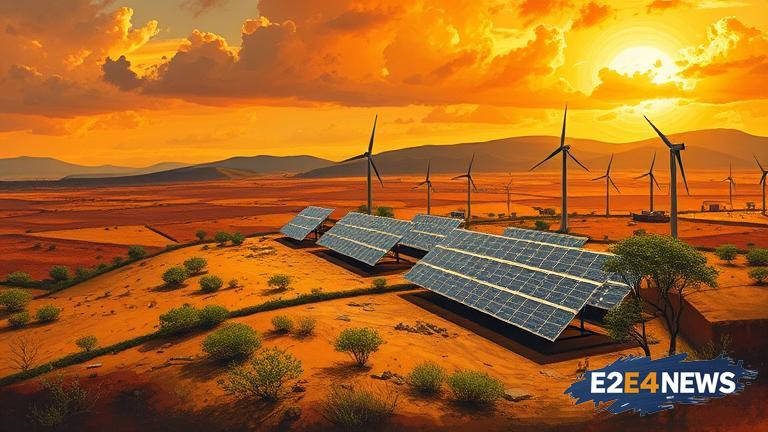The African continent is witnessing a significant shift towards renewable energy, driven by the need to address the pressing issues of energy access, energy security, and climate change. With many countries still struggling to provide electricity to their citizens, renewable energy has emerged as a viable solution. Solar and wind power are becoming increasingly popular, with many African nations investing heavily in these sectors. In South Africa, for example, the government has set ambitious targets to increase the share of renewable energy in the national energy mix. Similarly, in Morocco, the country is aiming to generate 52% of its electricity from renewable sources by 2030. The use of renewable energy is not only helping to reduce greenhouse gas emissions but also creating new job opportunities and stimulating local economies. In Kenya, the Lake Turkana Wind Power project has created over 2,000 jobs and is expected to reduce carbon emissions by 740,000 tons annually. The project is also expected to increase the country’s electricity generation capacity by 15%. In Egypt, the government has launched several initiatives to promote the use of renewable energy, including the construction of the Benban Solar Park, one of the largest solar parks in the world. The park is expected to generate 1.8 gigawatts of electricity, enough to power over 1 million homes. The growth of renewable energy in Africa is also being driven by the declining cost of technology, making it more competitive with fossil fuels. In addition, many international organizations and donors are providing financial support to African countries to help them transition to renewable energy. The African Development Bank, for example, has committed to investing $25 billion in renewable energy projects across the continent by 2025. The European Union has also launched several initiatives to support the development of renewable energy in Africa, including the Africa-EU Renewable Energy Cooperation Program. The program aims to promote the use of renewable energy in Africa and to support the development of sustainable energy systems. Despite the many benefits of renewable energy, there are still several challenges that need to be addressed, including the lack of infrastructure and the high upfront costs of investment. However, with the right policies and support, renewable energy has the potential to transform the energy landscape of Africa and help the continent achieve its development goals. The use of renewable energy can also help to reduce the continent’s dependence on fossil fuels, which are a major contributor to climate change. In addition, renewable energy can help to improve energy access, particularly in rural areas where many communities lack access to electricity. The development of renewable energy in Africa is also expected to have a positive impact on the environment, reducing pollution and promoting sustainable development. Overall, the growth of renewable energy in Africa is a positive trend that has the potential to transform the continent’s energy landscape and promote sustainable development. With the right support and policies, Africa can become a leader in the use of renewable energy and help to mitigate the impacts of climate change. The continent’s renewable energy sector is expected to continue to grow in the coming years, driven by the need to address the pressing issues of energy access, energy security, and climate change. As the demand for energy continues to increase, renewable energy is likely to play an increasingly important role in meeting this demand. In conclusion, the renewable energy revolution in Africa is gaining momentum, driven by the need to address the pressing issues of energy access, energy security, and climate change. With the right policies and support, the continent can become a leader in the use of renewable energy and help to mitigate the impacts of climate change.
